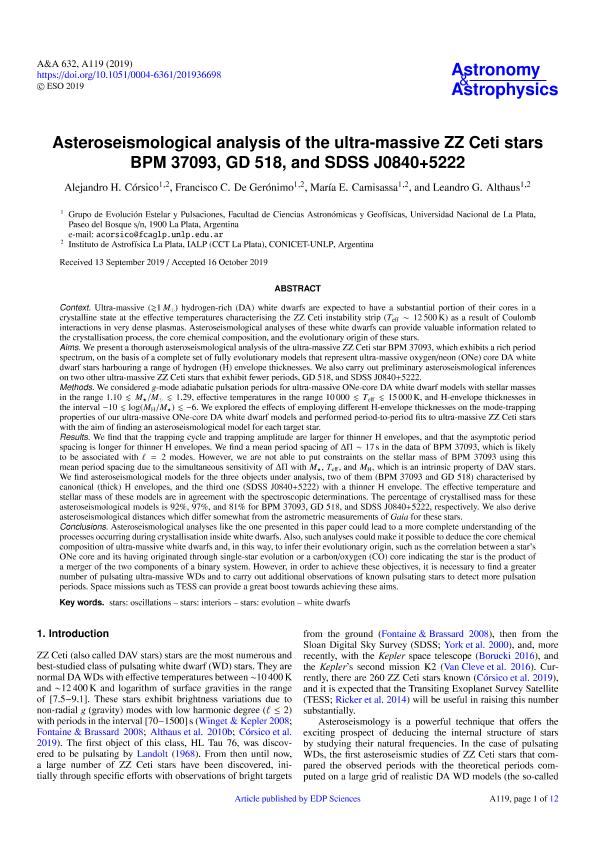Artículo
Asteroseismological analysis of the ultra-massive ZZ Ceti stars BPM 37093, GD 518, and SDSS J0840+5222
Corsico, Alejandro Hugo ; de Gerónimo, Francisco César
; de Gerónimo, Francisco César ; Camisassa, María Eugenia
; Camisassa, María Eugenia ; Althaus, Leandro Gabriel
; Althaus, Leandro Gabriel
 ; de Gerónimo, Francisco César
; de Gerónimo, Francisco César ; Camisassa, María Eugenia
; Camisassa, María Eugenia ; Althaus, Leandro Gabriel
; Althaus, Leandro Gabriel
Fecha de publicación:
13/12/2019
Editorial:
EDP Sciences
Revista:
Astronomy and Astrophysics
ISSN:
0004-6361
Idioma:
Inglés
Tipo de recurso:
Artículo publicado
Clasificación temática:
Resumen
Context. Ultra-massive (≳1 M⊙) hydrogen-rich (DA) white dwarfs are expected to have a substantial portion of their cores in a crystalline state at the effective temperatures characterising the ZZ Ceti instability strip (Teff ∼ 12 500 K) as a result of Coulomb interactions in very dense plasmas. Asteroseismological analyses of these white dwarfs can provide valuable information related to the crystallisation process, the core chemical composition, and the evolutionary origin of these stars. Aims. We present a thorough asteroseismological analysis of the ultra-massive ZZ Ceti star BPM 37093, which exhibits a rich period spectrum, on the basis of a complete set of fully evolutionary models that represent ultra-massive oxygen/neon (ONe) core DA white dwarf stars harbouring a range of hydrogen (H) envelope thicknesses. We also carry out preliminary asteroseismological inferences on two other ultra-massive ZZ Ceti stars that exhibit fewer periods, GD 518, and SDSS J0840+5222. Methods. We considered g-mode adiabatic pulsation periods for ultra-massive ONe-core DA white dwarf models with stellar masses in the range 1.10 ≲ M⋆/M⊙ ≲ 1.29, effective temperatures in the range 10 000 ≲ Teff ≲ 15 000 K, and H-envelope thicknesses in the interval −10 ≲ log(MH/M⋆)≲ − 6. We explored the effects of employing different H-envelope thicknesses on the mode-trapping properties of our ultra-massive ONe-core DA white dwarf models and performed period-to-period fits to ultra-massive ZZ Ceti stars with the aim of finding an asteroseismological model for each target star. Results. We find that the trapping cycle and trapping amplitude are larger for thinner H envelopes, and that the asymptotic period spacing is longer for thinner H envelopes. We find a mean period spacing of ΔΠ ∼ 17 s in the data of BPM 37093, which is likely to be associated with ℓ = 2 modes. However, we are not able to put constraints on the stellar mass of BPM 37093 using this mean period spacing due to the simultaneous sensitivity of ΔΠ with M⋆, Teff, and MH, which is an intrinsic property of DAV stars. We find asteroseismological models for the three objects under analysis, two of them (BPM 37093 and GD 518) characterised by canonical (thick) H envelopes, and the third one (SDSS J0840+5222) with a thinner H envelope. The effective temperature and stellar mass of these models are in agreement with the spectroscopic determinations. The percentage of crystallised mass for these asteroseismological models is 92%, 97%, and 81% for BPM 37093, GD 518, and SDSS J0840+5222, respectively. We also derive asteroseismological distances which differ somewhat from the astrometric measurements of Gaia for these stars. Conclusions. Asteroseismological analyses like the one presented in this paper could lead to a more complete understanding of the processes occurring during crystallisation inside white dwarfs. Also, such analyses could make it possible to deduce the core chemical composition of ultra-massive white dwarfs and, in this way, to infer their evolutionary origin, such as the correlation between a star’s ONe core and its having originated through single-star evolution or a carbon/oxygen (CO) core indicating the star is the product of a merger of the two components of a binary system. However, in order to achieve these objectives, it is necessary to find a greater number of pulsating ultra-massive WDs and to carry out additional observations of known pulsating stars to detect more pulsation periods. Space missions such as TESS can provide a great boost towards achieving these aims.
Palabras clave:
stars: oscillations
,
stars: interiors
,
stars: evolution
,
white dwarfs
Archivos asociados
Licencia
Identificadores
Colecciones
Articulos(IALP)
Articulos de INST.DE ASTROFISICA LA PLATA
Articulos de INST.DE ASTROFISICA LA PLATA
Citación
Corsico, Alejandro Hugo; de Gerónimo, Francisco César; Camisassa, María Eugenia; Althaus, Leandro Gabriel; Asteroseismological analysis of the ultra-massive ZZ Ceti stars BPM 37093, GD 518, and SDSS J0840+5222; EDP Sciences; Astronomy and Astrophysics; 632; A119; 13-12-2019; 1-12
Compartir
Altmétricas



